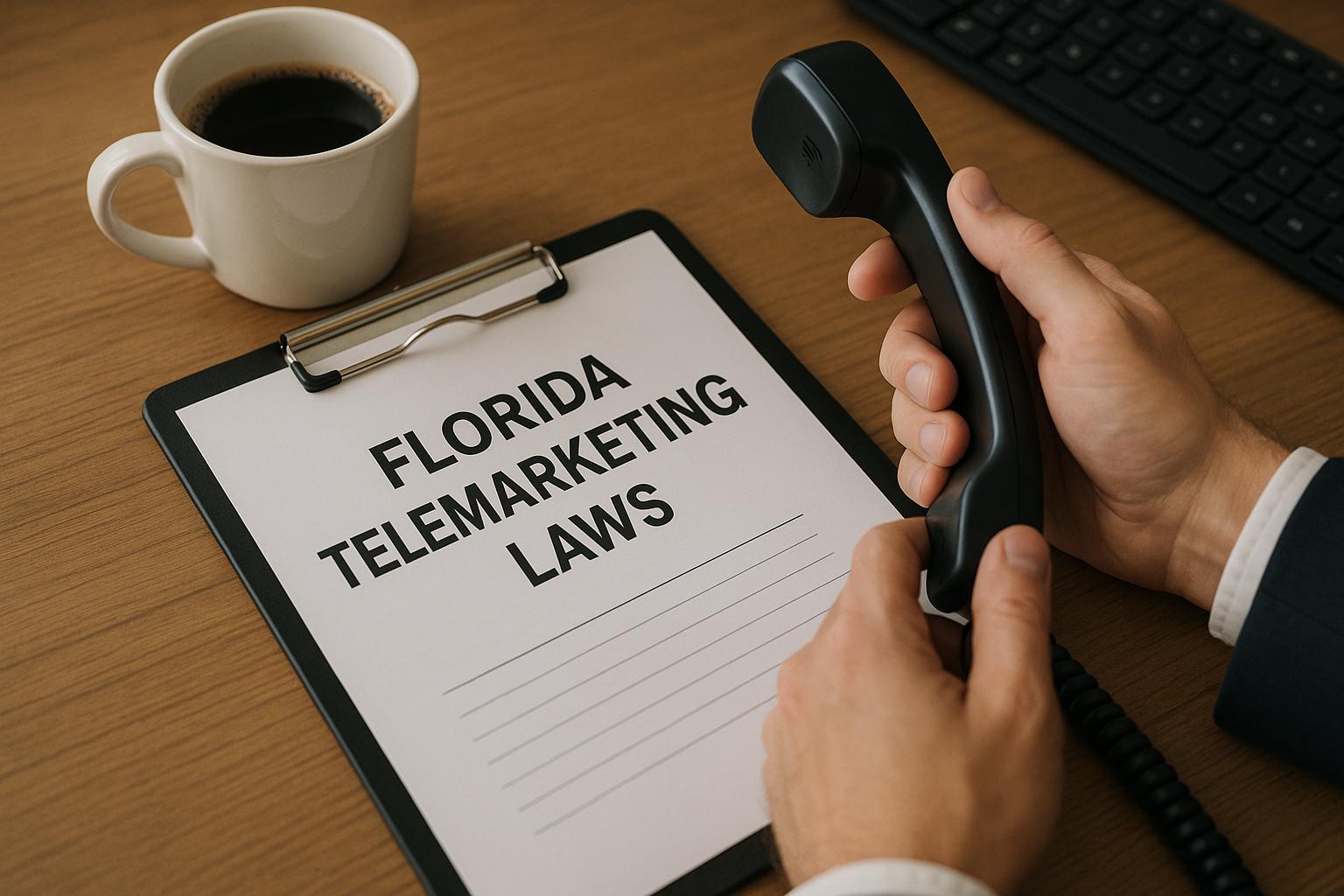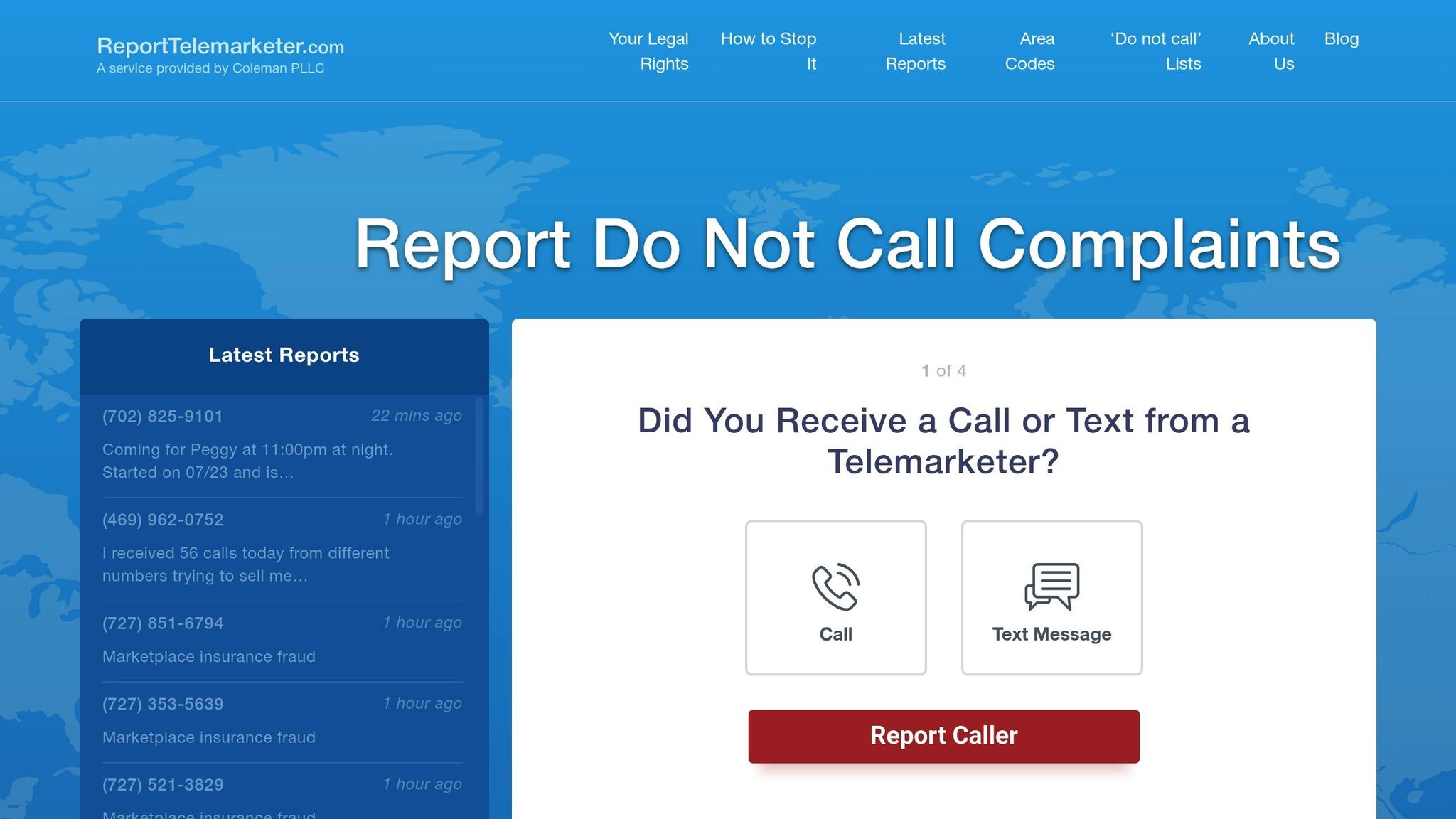
Florida telemarketing laws are strict, requiring most businesses to obtain licenses and follow specific rules. However, certain organizations are exempt. Here’s what you need to know:
- Nonprofits: Religious, charitable, and educational groups are typically exempt but may need to file affidavits and register with the state.
- Political Organizations: Calls made solely for political purposes are exempt, including from Do Not Call rules.
- Financial Institutions: Banks, credit unions, and insurers under federal or state regulation qualify for exemptions tied to their regulated activities.
- Media Companies: Exemptions apply to calls for subscriptions or editorial purposes but not broader commercial activities.
Even exempt groups must follow basic rules, like adhering to call time limits and honoring Do Not Call requests. Violations can lead to fines or loss of exemption status. Consumers can report issues and take legal action if their rights are violated.
Rowlett Real Estate School – Rules Regarding Telephone Solicitation – Florida Real Estate

Main Groups Exempt from Florida Telemarketing Laws
Florida law outlines 28 specific exemptions for certain groups and organizations, each with unique criteria. Knowing these exemptions can help businesses understand their obligations and allow consumers to identify legitimate calls from organizations operating within these legal boundaries. Below are the key groups that qualify for exemptions.
Nonprofit Organizations
Religious, charitable, and educational institutions generally fall under broad exemptions, depending on their classification and registration status. Groups soliciting funds for religious, charitable, political, or educational purposes are automatically exempt. However, other nonprofits must register with the Secretary of State, file an affidavit of exemption with the Florida Department of Agriculture and Consumer Services (FDACS), and display the filing receipt at their business location. FDACS may also require additional documentation to confirm the validity of the exemption before issuing the affidavit.
Political Organizations
Political organizations benefit from extensive exemptions under Florida’s telemarketing laws, reflecting protections for political speech under the First Amendment. These exemptions apply when calls are made exclusively for political purposes and are not tied to any campaign aimed at selling goods or services. Additionally, the do-not-call provisions of the Telephone Sales Rule do not apply to calls from political organizations, giving them greater flexibility in their outreach efforts.
Banks and Financial Institutions
Financial institutions under state or federal supervision enjoy notable exemptions from Florida’s telemarketing rules, though these exemptions come with certain restrictions. Covered entities include commercial banks, credit unions, savings and loan associations, insurers, and other financial institutions, provided their activities fall within the scope of their regulatory oversight. These exemptions are governed by Florida Statutes 501.608 and 501.616, which outline specific limitations. Institutions uncertain about how the law applies to them can file a petition for a declaratory statement with the state Office of Financial Regulation. While the exemptions are broad, they remain tied to the institution’s regulated activities.
Media Organizations
Media outlets such as newspapers and magazines are exempt when their telemarketing efforts focus on core editorial functions, like subscription sales, renewals, or reader surveys. However, if a media company ventures into broader commercial telemarketing activities, it may lose its exempt status and need to comply with standard licensing requirements. These exemptions apply strictly to calls related to subscriptions and editorial purposes, ensuring they align with the law’s overall framework.
Requirements for Exemption Status
Florida provides 28 telemarketing exemptions, but qualifying for these exemptions isn’t as simple as claiming them. Organizations must meet specific criteria and provide proper documentation to prove their eligibility before making any calls. These measures ensure that exemptions are granted only to those who genuinely qualify, keeping practices in line with Florida’s regulatory standards.
One-Time Transactions
Even one-off telemarketing efforts must meet the exemption criteria to qualify. For instance, if a nonprofit plans a single fundraising campaign, it must still register with the Secretary of State before making any calls. The key factor here is the purpose and frequency of the solicitation, not just the number of calls made. This ensures that even isolated telemarketing efforts adhere to Florida’s strict guidelines.
Nonprofit Registration Requirements
While certain nonprofits may automatically qualify for exemptions, others must go through additional steps to establish eligibility. Religious, charitable, political, or educational organizations that solicit solely for their core purposes may qualify without extra filings. However, other nonprofits must:
- Prove tax-exempt status.
- Register with the Secretary of State.
- File an affidavit with the Florida Department of Agriculture and Consumer Services (FDACS).
- Register annually under Chapter 496, F.S., if soliciting donations.
FDACS may also request further documentation to confirm eligibility. Nonprofits can obtain the required forms by contacting FDACS at 1-800-HELP-FLA (435-7352). It’s important to keep the receipt of filing for audit purposes.
Organizations seeking donations from Florida residents – or operating from within Florida – must comply with additional requirements under the Solicitation of Contributions Act (Chapter 496, F.S.). Larger charities that don’t qualify as "small charities" must adopt a conflict of interest policy and provide a statement confirming that all board members have reviewed it.
Call Purpose Requirements
The purpose of the call plays a significant role in determining exemption eligibility. According to Florida Statute 501.604, calls made for religious, charitable, political, or educational purposes may qualify for an exemption from the Telemarketing Act. However, organizations must ensure their calls strictly align with their exempt purpose. For example, a charity soliciting donations for disaster relief would retain its exemption. On the other hand, if the same organization were to sell products or services, it would generally fall under standard telemarketing regulations.
For nonprofits, exemptions apply only to noncommercial calls made under their tax-exempt and state-registered status. Even exempt organizations must follow basic telemarketing rules to ensure consumer protection.
Organizations that engage in both exempt and nonexempt activities must maintain separate documentation for their charitable work while obtaining standard telemarketing licenses for any commercial activities. This separation ensures compliance with Florida’s telemarketing regulations.
sbb-itb-a8d93e1
When Exemptions Don’t Apply
Even organizations that qualify for exemptions must adhere to specific rules to maintain their status. If they stray beyond their exempt activities or fail to maintain proper documentation, they can find themselves subject to the full scope of telemarketing regulations.
For instance, exempt organizations are still required to follow rules regarding prior express consent, limits on call frequency, and restrictions on permissible call times. An exempt nonprofit cannot call Florida residents outside the allowed hours or ignore requests to be placed on a do-not-call list. These foundational rules are accompanied by additional administrative obligations, particularly in the area of record keeping.
Record Keeping Requirements
Even with their exemptions, organizations are not free from paperwork. The Florida Telemarketing Act, specifically section 501.6175, outlines recordkeeping rules that apply even to some exempt entities.
For certain exemptions, organizations must maintain a valid affidavit of exemption with the Florida Department of Agriculture and Consumer Services (FDACS). This affidavit must be prominently displayed at the organization’s place of business. FDACS may also request supplementary documentation to verify the validity of the exemption before issuing the affidavit. Organizations should be ready to provide this information if asked.
How Organizations Lose Exemption Status
Failing to follow the rules or engaging in activities outside the scope of their exemption can lead to losing that status. Exemptions are not permanent, and organizations risk forfeiture if they change their operations or fail to comply with documentation requirements.
One of the most common reasons for losing exemption status is engaging in commercial activities. If a nonprofit shifts from soliciting donations to selling products or services, it may no longer qualify for exemption. The key question is whether the call primarily supports the organization’s exempt purpose or is aimed at generating commercial revenue.
For example, exempt organizations are prohibited from requiring immediate credit card authorization during calls. If an exempt nonprofit begins demanding such payments, it risks losing its exemption and could face penalties for operating without proper licensing.
Additionally, failing to renew affidavits or allowing state registrations to lapse can result in the loss of exemption status. Organizations that engage in both exempt and non-exempt activities must clearly separate these functions. If commercial activities become the primary focus, the exemption could be revoked.
Recent changes to the Florida Telemarketing Act, introduced through CS/SB 1120, impact both exempt and non-exempt entities. To avoid compliance issues, organizations should routinely review their policies and procedures to ensure they align with the latest regulations.
Losing exemption status can have serious financial implications. Organizations that lose their exemption must obtain a telemarketing business license, which costs $1,500 annually. They must also license their sales staff at $50 per person each year and post a security bond of at least $50,000. These requirements apply regardless of whether the organization is based in Florida or contacting residents from out of state.
Consumer Rights and Reporting Violations
Florida has some of the toughest telemarketing laws in the country, giving consumers clear rights to fight back against unwanted calls. These protections are designed to shield individuals from aggressive and intrusive telemarketing practices.
Under the Florida Telemarketing Act, telemarketers must follow strict rules. They can only call between 8:00 a.m. and 8:00 p.m., must identify themselves within the first 30 seconds, are prohibited from blocking their caller ID, and are limited to three calls per day on the same subject. Additionally, they must inform consumers of their right to cancel and provide refunds if a written request is made within seven days.
One critical protection relates to the use of automated calling systems, or autodialers. Florida law explicitly prohibits telemarketing calls made with automated dialing systems or pre-recorded messages unless the recipient has given prior express written consent. As stated in the law:
"A person may not make or knowingly allow a telephonic sales call to be made if such call involves an automated system for the selection or dialing of telephone numbers or the playing of a recorded message when a connection is completed to a number called without the prior express written consent of the called party."
If these rules are violated, consumers can take action. Complaints can be filed with the Florida Division of Consumer Services or the Florida Attorney General. Legal action is also an option, with potential compensation including actual damages or $500 (whichever is higher) per violation, up to $1,500 for willful violations. In severe cases, violators may face civil penalties of $10,000 per violation and even criminal charges.
How ReportTelemarketer.com Helps Consumers

For those overwhelmed by unwanted telemarketing calls and texts, ReportTelemarketer.com provides a dedicated solution. This platform has already assisted more than 30,000 individuals by investigating reported numbers using advanced tools. If a telemarketer is found to be operating without proper consent, the service can file cease and desist letters or formal complaints on your behalf.
The best part? There’s no out-of-pocket cost for consumers. Attorney fees are recovered from telemarketers once the calls stop. To promote accountability, the platform also publishes details about reported telemarketers, including phone numbers, call or text information, and reporting dates.
How to Report Telemarketing Violations
Taking action against telemarketing violations starts with documenting the details. Here’s what to do:
- Record the phone number, date, and time of the call.
- Note the content of the conversation and whether the caller identified themselves.
- If the violation involves a text message, take a screenshot for evidence.
For Florida-specific violations, you can file a complaint with the Florida Division of Consumer Services online or by calling 800-HELP-FLA (435-7352). You can also report violations to the Florida Attorney General through their website. On a federal level, the Federal Communications Commission (FCC) handles complaints about robocalls and autodialer violations at fcc.gov/complaints, while the Federal Trade Commission (FTC) addresses Do Not Call violations and telemarketing fraud. As the FCC notes:
"By filing a consumer complaint and telling your story, you contribute to federal enforcement and consumer protection efforts on a national scale and help us identify trends and track the issues that matter most."
For scams like IRS-related calls, report them to the Treasury Inspector General for Tax Administration (TIGTA) at tigta.gov or call 1-800-366-4484.
Even small complaints make a difference. They contribute to larger enforcement efforts and help identify patterns in telemarketing abuse. Since July 1, 2021, Florida law has also allowed consumers to file private lawsuits for telephone solicitation violations, giving you an additional way to hold violators accountable.
Know Your Rights Under Florida Law
Understanding Florida’s telemarketing exemptions helps you distinguish between legal and illegal contact. These exemptions apply to certain groups, like nonprofit organizations, political campaigns, banks, and media companies. However, even these entities must follow rules designed to protect your interests, such as adhering to specific calling times and properly identifying themselves.
Even if an organization is exempt, they are still required to follow basic consumer protection rules. They must clearly identify themselves, call only during allowed hours, and limit the frequency of their calls. Florida law also mandates that telemarketers obtain prior express written consent before using autodialers or pre-recorded messages. If you receive robocalls without providing this consent, it’s a violation of your rights.
To ensure a telemarketer is legitimate, you can check their license on the Florida Division of Consumer Services website. Additionally, confirm whether your number is listed on the Florida Do Not Call List. Legitimate telemarketers are also required to disclose your cancellation rights and must honor any request to stop contacting you.
If a telemarketer violates these rules, you have options. You can file a complaint with the Florida Division of Consumer Services either online or by calling 800-HELP-FLA (435-7352). You may also take legal action against violators. Be sure to document key details – such as the phone number, date, time, and content of the call – to strengthen your case and secure your refund rights within the seven-day period.
The bottom line? Exemptions don’t mean organizations are above the law. Even those with legal exemptions must respect your rights, including your right to decline further contact. If they fail to comply, Florida law empowers you to take action and hold them accountable.
FAQs
What do nonprofits need to do to stay exempt from Florida’s telemarketing laws?
Nonprofits in Florida need to file an affidavit of exemption to maintain their exemption under the state’s telemarketing laws. This document isn’t just for filing – it should also be prominently displayed at their business location to verify their exempt status. Following these steps is crucial for staying within legal boundaries and avoiding potential penalties.
How can financial institutions determine if they are exempt from Florida’s telemarketing laws?
Financial institutions might not be subject to Florida’s telemarketing laws if they fall under the category of supervised financial institutions or their affiliates, as defined by state regulations. This generally includes federally or state-regulated entities like banks, credit unions, and similar organizations.
If you’re uncertain about whether your institution qualifies for this exemption, it’s a good idea to review the relevant sections of Florida’s telemarketing laws or consult with a legal professional for clarification.
What can I do if I keep getting unwanted telemarketing calls from organizations that are exempt from Florida’s telemarketing laws?
If you’re being bombarded with telemarketing calls from organizations that don’t fall under Florida’s telemarketing laws, there are still ways to tackle the problem. Start by reporting these calls to the Florida Department of Agriculture and Consumer Services or by adding your number to the Florida Do Not Call Program, which can help cut down on future interruptions. You can also file complaints with the Federal Trade Commission (FTC) to prompt further investigation.
For a more direct solution, consider using ReportTelemarketer.com. This free service looks into telemarketing violations and takes steps to stop unwanted calls. They can even issue cease and desist letters or file formal complaints when needed.